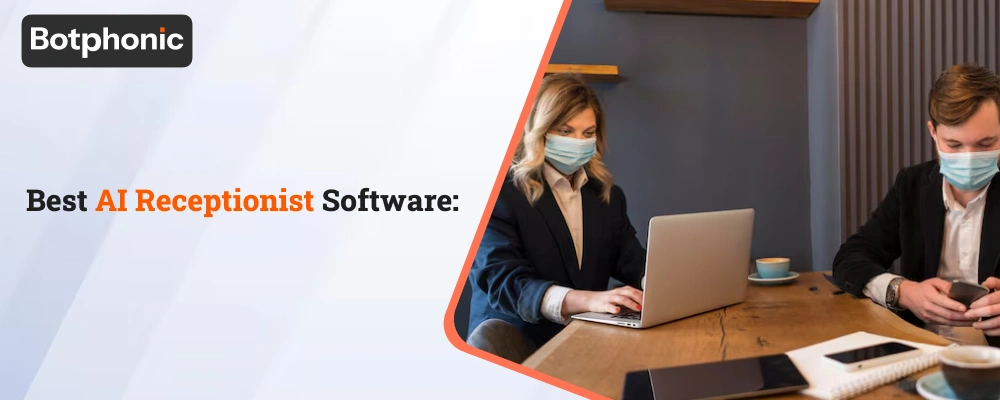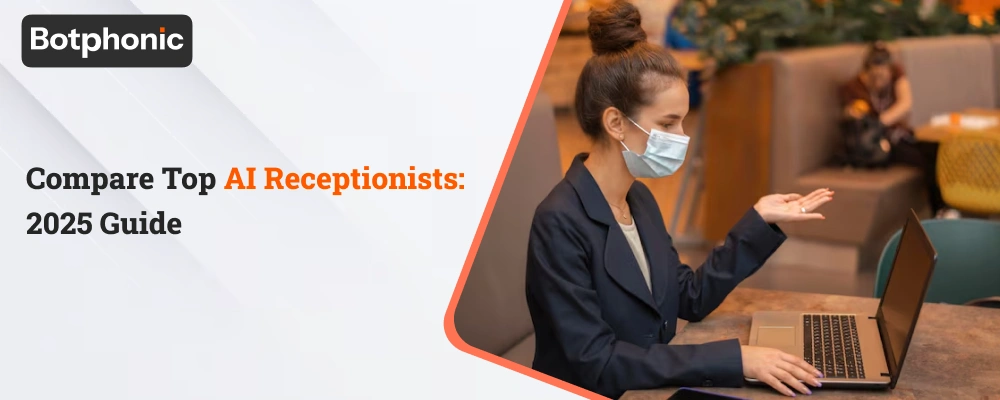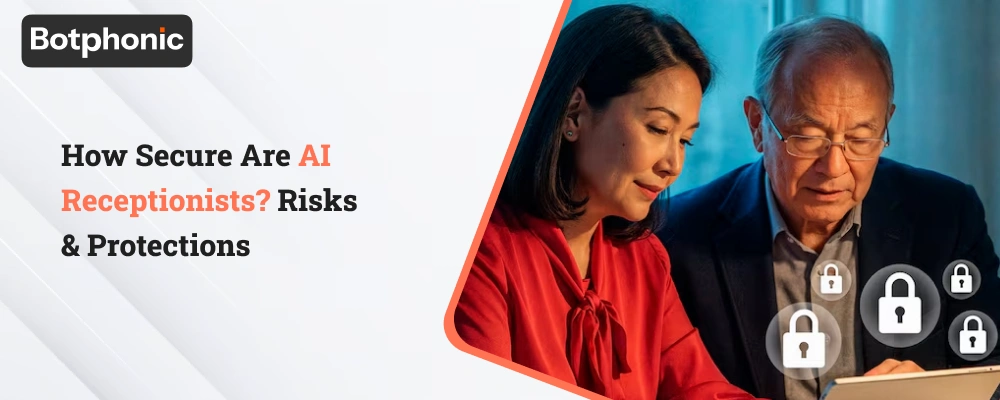
Summarize Content With:
Quick Summary
Using an AI receptionist in your business, and still you don’t know about its risks and protections needed to implement? AI receptionists are no doubt reducing workload over the human staff and still increasing operational efficiency, but there are still a few people who ask, “Is using an AI receptionist really secure?” Let’s find an answer to that question today. In this blog, you will get to discover about:
- AI receptionist security
- Why is security a necessity for an AI receptionist?
- How are these AI call receptionists ensuring your security?
- The compliance required for an AI receptionist.
- The best practices for using an AI virtual receptionist.
Introduction
As AI receptionists have quickly become a lifesource of businesses, and why it shouldn’t be, after all, it’s a smart investment. Along with task automation and responding to calls, making work easier, there are certain times when its data privacy is questioned, and many issues are raised for AI receptionist data protection. One of the main reasons for their adoption can be considered as the user’s privacy and the way they handle customers’ sensitive details.
Integrating secure data storage, advanced encryption, and also having strict access controls is one of the main components of these AI receptionist security. Creating the right equilibrium between securing the details of clients and increasing operational efficiency is the key to how AI receptionists are empowering businesses to innovate.
What is AI Receptionist Security?
AI receptionist data security refers to the practices, technologies implemented, and also measures taken to secure the data. The chunks of data, communication made through AI-powered receptionist systems, are asked to be secured. This system handles numerous and essential sensitive information such as customer names, phone numbers, and appointment details, and even there are times when financial or healthcare details are also shared.
If proper security measures are not followed, this informations might be vulnerable to several cyberattacks, unauthorized attacks, and even regulatory non-compliance.
Core elements of AI Receptionist Security
- Data Protection: Encrypting sensitive data shared by users in transit and when at rest using advanced encryption standards.
- Access Control: Adding a role-based permission and secure authentication will help restrict system access.
- Compliance with Regulation: Adhering to data privacy laws such as HIPAA, GDPR, and CCPA will help alot with compliance, but it should be well researched and industry-specific.
- Voice and Call Security: To effectively prevent spoofing or other unauthorized call handling, it helps secure data with the effective implementation of voice recognition.
- API and Integration Security: Through secure APIs and tokens, protect the connections and interactions made via CRMs, scheduling software, and VoIP systems.
Why Security is Critical for AI Receptionists?
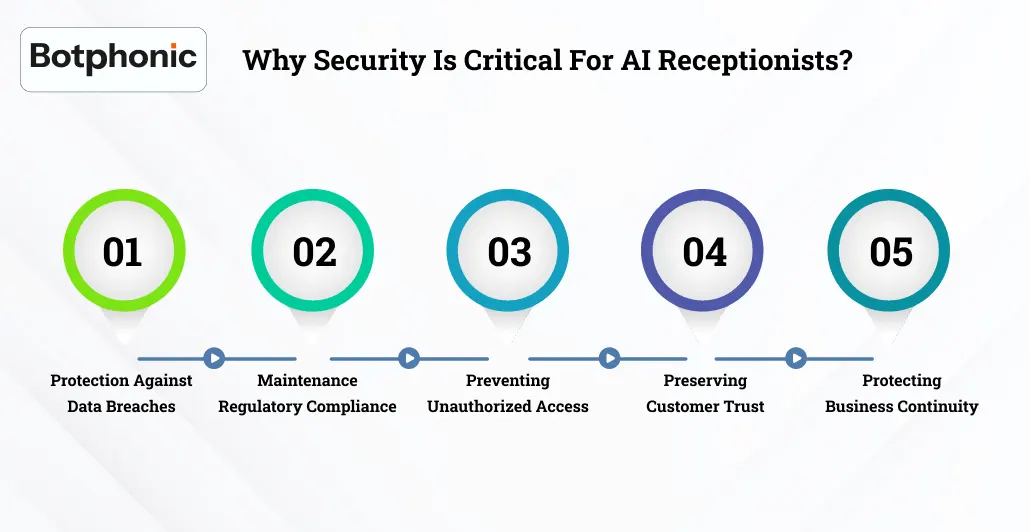
An AI receptionist manages sensitive information, including all the personal details, appointment data, including financial and healthcare details too. These systems operate through cloud platforms, voice recognition, and even APIs. If not secured properly, they can also become an initial target of cyber threats.
1. Protection Against Data Breaches
- AI receptionists are designed to store and transmit the private customer information. Even if a single breach occurs, it might lead to thousands of sensitive informations exposed to unauthorized users, leading to identity theft or fraud.
- For instance, in healthcare, a breach could result in HIPAA violations and various legal consequences.
2. Maintenance Regulatory Compliance
- Industries like healthcare, finance, and law are required to follow strict data privacy laws, such as HIPAA, GDPR, CCPA, etc
- Non-compliance with these laws can lead to fines and lawsuits.
3. Preventing Unauthorized Access
- Due to poor access control or a weak authentication method, unauthorized users to manipulate calls or even steal data.
- Ensure the security of AI systems using multi-factor authentication, role-based access, and even encrypted APIs
4. Preserving Customer Trust
- Businesses are now relying on AI receptionists and AI call assistant to provide a professional experience to their clients.
- If there’s any sign of a security flaw from your side, it might push your customers to your competitors.
5. Protecting Business Continuity
- Cyberattacks can create a disruption in the AI workflow, leading to several missed calls, lost leads, and downtime.
- Implementing security safeguards ensures operational resilience.
AI receptionist security is not optional anymore, but it’s a basis of trust, compliance, and operational reliability that attracts your customers.
How AI Receptionist Systems Ensure Security?
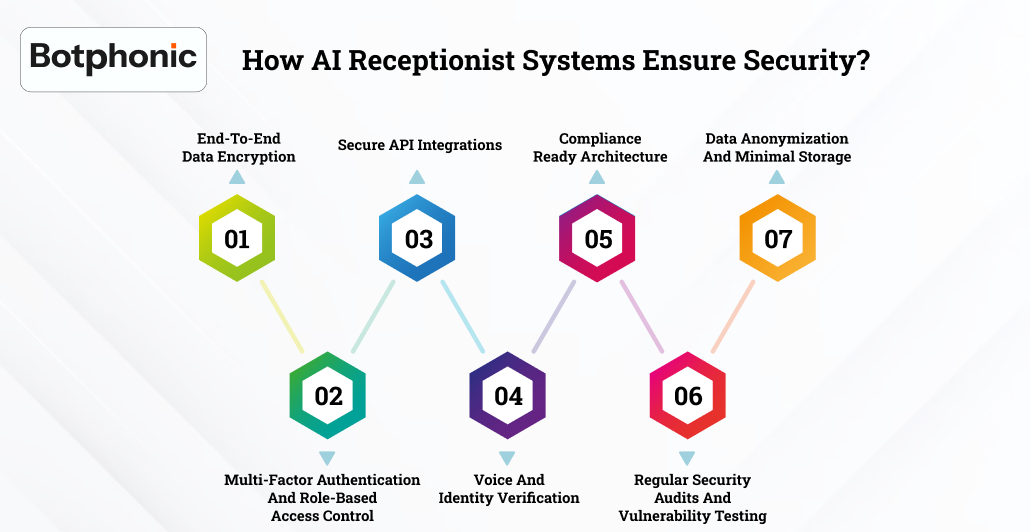
AI receptionists can easily employ multiple layers of protection to ensure their sensitive information is protected, and also that compliance and business continuity are maintained. There are measures that are designed to eliminate the risks of data breaches, unauthorized access, and even compliance violations.
1. End-to-End Data Encryption
- In Transit: Even if you are using the best AI virtual receptionist with 24/7 service, ensure that the data transmitted from AI receptionists or AI call assistant users, and other integrated systems, is protected using the SSL or TLS protocol.
- At Rest: Stored data is protected with strong encryption standards like AES-256, and even call logs and customer details are encrypted.
2. Multi-Factor Authentication and Role-Based Access Control
- MFA helps ensure that only authorized users are able to access the system by adding an additional verification process.
- Role-based access control(RBAC) assists by limiting data visibility to specific teams, based on roles.
3. Secure API Integrations
- AI receptionists integrate with several scheduling platforms, CRMs, and even VoIP systems.
- Using OAuth tokens and encrypted connections, APIs prevent unauthorized data exchanges.
4. Voice and Identity Verification
- Secure virtual receptionist systems should employ voice biometrics to confirm callers’ identities.
- Deploying this into the AI system helps prevent fraud, for instance, impersonation or spoofing.
5. Compliance-Ready Architecture
- HIPAA, GDPR, and CCPA compliance built-in features are required for:
- Encrypting storage for sensitive health data.
- Collecting consent-based data.
- Audit logs for regulatory reporting.
6. Regular Security Audits and Vulnerability Testing
- Experimenting with continuous penetration testing and vulnerability scanning helps detect the weakness of AI receptionist software even before it’s detected.
- Regular software updates ascertain security gaps are patched and ensure systems are resilient against evolving threats.
7. Data Anonymization and Minimal Storage
- AI receptionist encryption reduces the risk by anonymizing caller data whenever possible.
- Businesses can even set a few data retention policies that automatically delete old records and minimize exposure.
Compliance Requirements for AI Receptionists
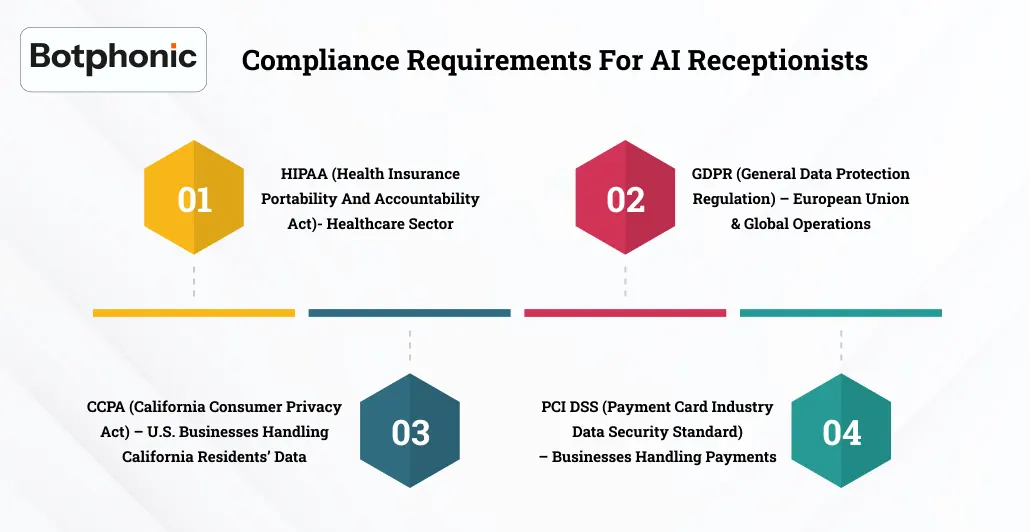
Not just AI call assistants, but AI receptionist software should also adhere to strict compliance standards that protect sensitive information and maintain customers’ trust.
1. HIPAA (Health Insurance Portability and Accountability Act)- Healthcare Sector
- U.S healthcare providers, clinics, and other healthcare-related businesses should ensure compliance.
- It helps by:
- Encrypting patients’ health information and securing storage.
- Ensuring to sign a business associate agreement (BAAs) with AI vendors for shared compliance responsibility.
If there’s non-compliance, it might lead to fines up to $1.5 million and even loss of patients’ trust.
2. GDPR (General Data Protection Regulation) – European Union & Global Operations
- Any business that serves EU residents, regardless of the company’s location.
- There are certain requirements, for instance:
- Collecting data only after clear consent.
- Also enables users of the “right to be forgotten”, which ensures that the data will be deleted from the system if requested.
- Ensures data portability, where customers can easily transfer their data securely.
Violations of these regulations can lead to penalties, which would be about €20 million or 4% of global revenue.
3. CCPA (California Consumer Privacy Act) – U.S. Businesses Handling California Residents’ Data
- For-profit companies that meet revenue or data thresholds need to follow this rule.
- For these requirements, that need to be followed are:
- Provides consumers with proper disclosure about the data that is collected and how it’s going to be used.
- Allows users to opt out of their data sharing or selling.
- Protects customers’ details from unauthorized access and breaches.
CCPA enforcement is growing as time goes by, and even penalties are reaching $7,500 per violation.
4. PCI DSS (Payment Card Industry Data Security Standard) – Businesses Handling Payments
- This rule is required for AI receptionist software who are integrated with billing or payment systems.
- The major requirements for the same are as follows:
- Encrypting credit card data during transmission.
- Testing security systems regularly.
- To restrict access to payment data to authorized personnel only.
Best Practices for Businesses Using AI Receptionists
Now that we have read the regulations and the challenges that you might face after violations of the same, how about knowing some best practices to follow? Implementing best practices ensures that the AI receptionist is not just being effective in the workflow management but is also safe and compliant. Let’s start with that, then
1. Choose a Security Compliant Vendor
- Ensure that your provider is meeting all the required regulations, such as HIPAA, GDPR, or CCPA requirements.
- Don’t forget to commit only after they have the proof of compliance and security certifications.
2. Use Strong Authentication and Access Control
- Ensure to enable multi-factor authentication for better security.
- Apply role-based access so the sensitive data’s exposure is limited and confidential.
3. Encrypt All Data
- Secure end-to-end encryption for data, when in transit and even at rest.
- Enable call recording protection and depersonalization, whenever possible.
4. Set Clear Data Retention Policies
- Set a limit for the data and time frame, and when it needs to be stored.
- Delete outdated records to eliminate the risk of exposure in case of breach, and communicate policies transparently to customers.
5. Conduct Regular Security Audits
- Regularly perform vulnerability assessments and penetration testing annually.
- Ensure to stay updated regarding evolving regulations and maintain documented audit logs for regulatory reporting.
6. Have an Incident Response Plan
- There might be times when there’s a breach of data even after following safety procedures.
- Ensure to have a data breach response plan that outlines:
- Notifications process to customers, regulators, and partners.
- Steps to contain the breach before it gets more complicated.
- Post-incident reviews to strengthen security procedures.
Conclusion
The benefit of having a secure AI receptionist is not a question anymore, but it’s a needed answer that every business needs to have. Having a secure and best AI virtual receptionist with 24/7 service helps build customer trust. Furthermore, letting them have the option of opting out of sharing their information is a major reason that lets consumers be honest with you.
Following regulations such as HIPAA, GDPR, CCPA, PCI DSS, and other industry-specific and local laws helps businesses to be more reliable and trustworthy. Knowing why these security compliance has become important for businesses to recognize.
Searching for a secure AI receptionist? Don’t worry, we are here, contact Botphonic today!!
